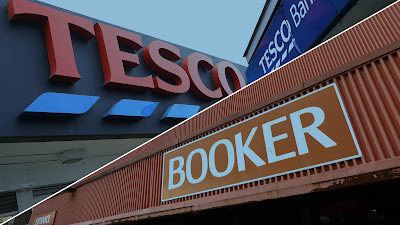Update – Tesco’s takeover of Booker Not Yet a Done Deal
This very brief post provides a small update on a continuing
story that
has been covered throughout here in Financial
Regulation Matters. Tesco has been in the news a lot recently, whether that
be on account of aiming to move
into the ‘discount supermarket’ marketplace, or on account of a massive
amount of job losses as the company goes through a restructuring process, both
on the shop
floor and across
management. However, our focus today will be on providing an update to the
ongoing attempted takeover of the wholesale firm Booker.
The proposed takeover of Bookers has been a protracted one,
and although
the deal has been given the go-ahead, slightly controversially, from
competition regulators, there are still a number of hurdles to clear before
the deal can be completed. Whilst the approval from the competition regulator
was a major hurdle, getting everybody on side is perhaps the largest hurdle
and, in that sense, the deal still has some way to go before it can cross the
finish line. This was demonstrated towards the end of last week when the
advisory firm Institutional Shareholder Services (ISS) advised Booker
shareholders to reject the deal as it is being proposed, on account of there
being, in their view, ‘limited
potential benefit’ for them as Booker shareholders, ultimately concluding
that the deal should be rejected in its current form.
This development follows Sandall Asset Management, who
themselves hold 1.75% on Booker, also declaring that they are against the
current deal, at least in its current form. For them, they believe
that the deal undervalues Booker significantly, with their claim being that
the company is worth between 255 and 265p per share, not the 205.3p currently
on offer from Tesco. To resolve the issue, Sandall Asset Management are calling
for the firm’s 2018 profits to be paid out, in full, as part of a closing dividend
to its shareholders to account for the envisioned loss; whether or not this
becomes a reality is another matter entirely – Tesco is currently only offering
65% of 2018’s profits as a closing dividend.
What this saga does show is the precarious nature of a
corporate takeover, and the many elements which must be in place before the
takeover is completed. What is likely going to be the case is that Tesco raises
their offer ever so slightly, with the offer then being just enough to tempt
doubters into taking what they can get over and above what has already been
suggested. However, it is worth paying close attention to developments within
Tesco in the coming months and years, because their restructuring that was
designed to right some of the wrongs committed under previous leaderships i.e.
an aggressive global expansion that did not have the desired effects, is well
under way and will see the famous store repositioned within the marketplace. If
we add to that the effects of the U.K.’s secession from the European Union and
the effect that may have upon consumer spending, how Tesco negotiates these
choppy waters may determine its future for quite some time.
Keywords: Tesco, Booker, Competition, Takeover, Business,
Brexit, Shareholders, Investing, @finregmatters.





Comments
Post a Comment